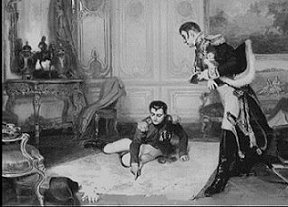
(Following from this post.)
A wargame campaign has a central Point of Contention over which the factions contend. Each faction has a core Cause For Action concerning that Point of Contention. These stem from, and are informed by, the religions (and thus cultures) of the contending factions- as are the Win and Loss Conditions.
The wargame campaign structure still applies to expeditionary campaigns, to political campaigns, and to mercantile campaigns. There's just less open warfare by (mostly) formal military forces.
In addition to the formal combatants contending, there are an uncounted array of opportunists and third parties that either insert themselves into the campaign or are swept up in it by the efforts of others. They have their own aims; some can be brought on-side (if only for a time) while others prove mutually obstructive if not hostile.
I have just describe both a typical Kriegspiel game and a typical Braunstein scenario. All that differs is the scope and scale of play.
Add in unreal elements and your wargame campaign turns into a fantasy wargame campaign.
Yes, just like that.
For a smaller area, as most of the Bros have done when starting out, what would be those third parties on the big map are now significant factions or threats in the local area and playing them against (or for) each other through the efforts of adventuring parties looking for gold and glory.
Given the conceit of the base camp being the nascent stronghold of a local faction leader (i.e. a Name-level NPC), this can sustain regular play for months- more with multiple active parties of adventurers leading hirelings in sorties.


With multiple active parties, and many players rotating through the table, you have the feel of a lively base for mercenaries and adventurers to operate from in pursuit of their own personal objectives while helping the stronghold's master fulfill his. Both sides benefit from the arrangement, and the more the adventurer demonstrates value to the leader the greater the likelihood that leader formally extends a place in his organization- and both the would-be Client and the would-be Patron are controled by players..
It is this interaction between the Macro and the Micro that makes it into a proper wargame campaign.
That players have the power to choose their own course of action does not change it. Posting a bounty, or directly contracting a mercenary band, to handle an issue is still engaging in actions pursuing an objective in a wargame campaign; paying out that bounty, or fulfilling that contract, still means that something desirable to the faction leader got done and thus the leader's campaign advanced accordingly.
The Client aids the Patron by providing useful service in return for material or political favor. The Patron aids the Client by giving him guidance in his affairs and protection from other powers like himself. This can be fractal in nature. (If you see the Feudal structure here, that is intentional; it is a formalization of the Greco-Roman model of Patron-Client relations.)
In terms of play, lower-level characters can aide higher-level characters making Big Picture plays; they in turn gain in terms of training, secure operations base to work from, and a mix of raw money payment and in-kind renumeration (favors, items, etc.) that helps them achieve their goals and develop their own career acumen.
This is a perfect virtuous feedback loop, as in time a successful Client can be provided territory by their Patron to conquer and tame into a stronghold of his own- and thus the cycle begins anew as he too will need to cultivate and foster his own Clients. A major campaign event, therefore, comes when a major Patron calls upon his Clients to aide him- setting off a chain of Client calls to feed back up the chain.
You need no additional product to make this cycle of campaign play work; the three core rulebooks for Advanced Dungeons & Dragons 1st Edition will be more than enough to wage fantasy adventure wargame campaigns for the rest of your life- and never again Consume Product to enjoy yourself.
No comments:
Post a Comment
Anonymous comments are banned. Pick a name, and "Unknown" (et. al.) doesn't count.